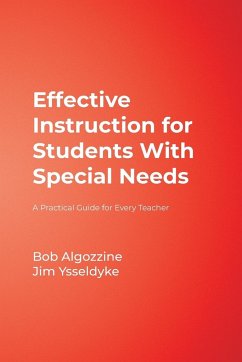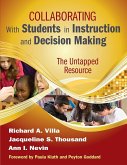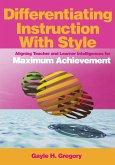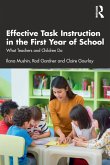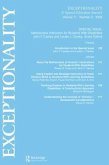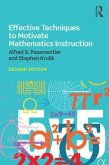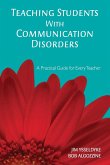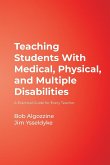Bob Algozzine, Jim Ysseldyke
Effective Instruction for Students With Special Needs
A Practical Guide for Every Teacher
28,99 €
inkl. MwSt.
Versandfertig in 1-2 Wochen

14 °P sammeln
Bob Algozzine, Jim Ysseldyke
Effective Instruction for Students With Special Needs
A Practical Guide for Every Teacher
- Broschiertes Buch
- Merkliste
- Auf die Merkliste
- Bewerten Bewerten
- Teilen
- Produkt teilen
- Produkterinnerung
- Produkterinnerung
Including a pretest, posttest, and key vocabulary terms, this helpful guide presents the key components of highly effective instruction and the accommodations to be made for students with special needs.
Andere Kunden interessierten sich auch für
![Collaborating With Students in Instruction and Decision Making Collaborating With Students in Instruction and Decision Making]() Richard A. VillaCollaborating With Students in Instruction and Decision Making43,99 €
Richard A. VillaCollaborating With Students in Instruction and Decision Making43,99 €![Differentiating Instruction With Style Differentiating Instruction With Style]() Gayle H. GregoryDifferentiating Instruction With Style39,99 €
Gayle H. GregoryDifferentiating Instruction With Style39,99 €![Effective Task Instruction in the First Year of School Effective Task Instruction in the First Year of School]() Ilana MushinEffective Task Instruction in the First Year of School51,99 €
Ilana MushinEffective Task Instruction in the First Year of School51,99 €![Mathematics Instruction for Students With Disabilities Mathematics Instruction for Students With Disabilities]() Mathematics Instruction for Students With Disabilities38,99 €
Mathematics Instruction for Students With Disabilities38,99 €![Effective Techniques to Motivate Mathematics Instruction Effective Techniques to Motivate Mathematics Instruction]() Alfred S. PosamentierEffective Techniques to Motivate Mathematics Instruction58,99 €
Alfred S. PosamentierEffective Techniques to Motivate Mathematics Instruction58,99 €![Teaching Students With Communication Disorders Teaching Students With Communication Disorders]() Jim YsseldykeTeaching Students With Communication Disorders27,99 €
Jim YsseldykeTeaching Students With Communication Disorders27,99 €![Teaching Students With Medical, Physical, and Multiple Disabilities Teaching Students With Medical, Physical, and Multiple Disabilities]() Bob AlgozzineTeaching Students With Medical, Physical, and Multiple Disabilities28,99 €
Bob AlgozzineTeaching Students With Medical, Physical, and Multiple Disabilities28,99 €-
-
-
Including a pretest, posttest, and key vocabulary terms, this helpful guide presents the key components of highly effective instruction and the accommodations to be made for students with special needs.
Hinweis: Dieser Artikel kann nur an eine deutsche Lieferadresse ausgeliefert werden.
Hinweis: Dieser Artikel kann nur an eine deutsche Lieferadresse ausgeliefert werden.
Produktdetails
- Produktdetails
- Verlag: Corwin
- Seitenzahl: 128
- Erscheinungstermin: 21. März 2006
- Englisch
- Abmessung: 229mm x 152mm x 7mm
- Gewicht: 198g
- ISBN-13: 9781412938976
- ISBN-10: 141293897X
- Artikelnr.: 21747962
- Herstellerkennzeichnung
- Libri GmbH
- Europaallee 1
- 36244 Bad Hersfeld
- gpsr@libri.de
- Verlag: Corwin
- Seitenzahl: 128
- Erscheinungstermin: 21. März 2006
- Englisch
- Abmessung: 229mm x 152mm x 7mm
- Gewicht: 198g
- ISBN-13: 9781412938976
- ISBN-10: 141293897X
- Artikelnr.: 21747962
- Herstellerkennzeichnung
- Libri GmbH
- Europaallee 1
- 36244 Bad Hersfeld
- gpsr@libri.de
Bob Algozzine is a professor in the Department of Educational Leadership at the University of North Carolina and project codirector of the U.S. Department of Education-supported Behavior and Reading Improvement Center. With 25 years of research experience and extensive firsthand knowledge of teaching students classified as seriously emotionally disturbed, Algozzine is a uniquely qualified staff developer, conference speaker, and teacher of behavior management and effective teaching courses. He is active in special education practice as a partner and collaborator with professionals in the Charlotte-Mecklenburg schools in North Carolina and as an editor of several journals focused on special education. Algozzine has written more than 250 manuscripts on special education topics, including many books and textbooks on how to manage emotional and social behavior problems.
About A Practical Approach to Special Education for Every Teacher
Acknowledgements
About the Authors
Self-Assessment I
Introduction to Effective Instruction for Students With Special
1.What Are the Components of Effective Instruction?
Planning Instruction
Managing Instruction
Delivering Instruction
Evaluating Instruction
2.What Methods Should Teachers Use to Teach Students Who Are Exceptional?
Behavior Therapy
Precision Teaching
Ability Training
Direct Instruction
Cognitive Behavior Modification
Cognitive Skills Training
Critical Thinking
Counseling Therapy
Learning Strategies
Cooperative Learning
Peer-Directed Learning
Peer Tutoring
Class-Wide Peer Tutoring
Social Skills Training
3. What Sort of Special Instructional Adaptations Are Available?
4. Effective Instruction in Perspective
5. What Have We Learned?
Key Points
Key Vocabulary
Self-Assessment II
Answer Key for Self-Assessments
On Your Own
Resources
Websites
Books
Organizations
References
Index
Acknowledgements
About the Authors
Self-Assessment I
Introduction to Effective Instruction for Students With Special
1.What Are the Components of Effective Instruction?
Planning Instruction
Managing Instruction
Delivering Instruction
Evaluating Instruction
2.What Methods Should Teachers Use to Teach Students Who Are Exceptional?
Behavior Therapy
Precision Teaching
Ability Training
Direct Instruction
Cognitive Behavior Modification
Cognitive Skills Training
Critical Thinking
Counseling Therapy
Learning Strategies
Cooperative Learning
Peer-Directed Learning
Peer Tutoring
Class-Wide Peer Tutoring
Social Skills Training
3. What Sort of Special Instructional Adaptations Are Available?
4. Effective Instruction in Perspective
5. What Have We Learned?
Key Points
Key Vocabulary
Self-Assessment II
Answer Key for Self-Assessments
On Your Own
Resources
Websites
Books
Organizations
References
Index
About A Practical Approach to Special Education for Every Teacher
Acknowledgements
About the Authors
Self-Assessment I
Introduction to Effective Instruction for Students With Special
1.What Are the Components of Effective Instruction?
Planning Instruction
Managing Instruction
Delivering Instruction
Evaluating Instruction
2.What Methods Should Teachers Use to Teach Students Who Are Exceptional?
Behavior Therapy
Precision Teaching
Ability Training
Direct Instruction
Cognitive Behavior Modification
Cognitive Skills Training
Critical Thinking
Counseling Therapy
Learning Strategies
Cooperative Learning
Peer-Directed Learning
Peer Tutoring
Class-Wide Peer Tutoring
Social Skills Training
3. What Sort of Special Instructional Adaptations Are Available?
4. Effective Instruction in Perspective
5. What Have We Learned?
Key Points
Key Vocabulary
Self-Assessment II
Answer Key for Self-Assessments
On Your Own
Resources
Websites
Books
Organizations
References
Index
Acknowledgements
About the Authors
Self-Assessment I
Introduction to Effective Instruction for Students With Special
1.What Are the Components of Effective Instruction?
Planning Instruction
Managing Instruction
Delivering Instruction
Evaluating Instruction
2.What Methods Should Teachers Use to Teach Students Who Are Exceptional?
Behavior Therapy
Precision Teaching
Ability Training
Direct Instruction
Cognitive Behavior Modification
Cognitive Skills Training
Critical Thinking
Counseling Therapy
Learning Strategies
Cooperative Learning
Peer-Directed Learning
Peer Tutoring
Class-Wide Peer Tutoring
Social Skills Training
3. What Sort of Special Instructional Adaptations Are Available?
4. Effective Instruction in Perspective
5. What Have We Learned?
Key Points
Key Vocabulary
Self-Assessment II
Answer Key for Self-Assessments
On Your Own
Resources
Websites
Books
Organizations
References
Index
